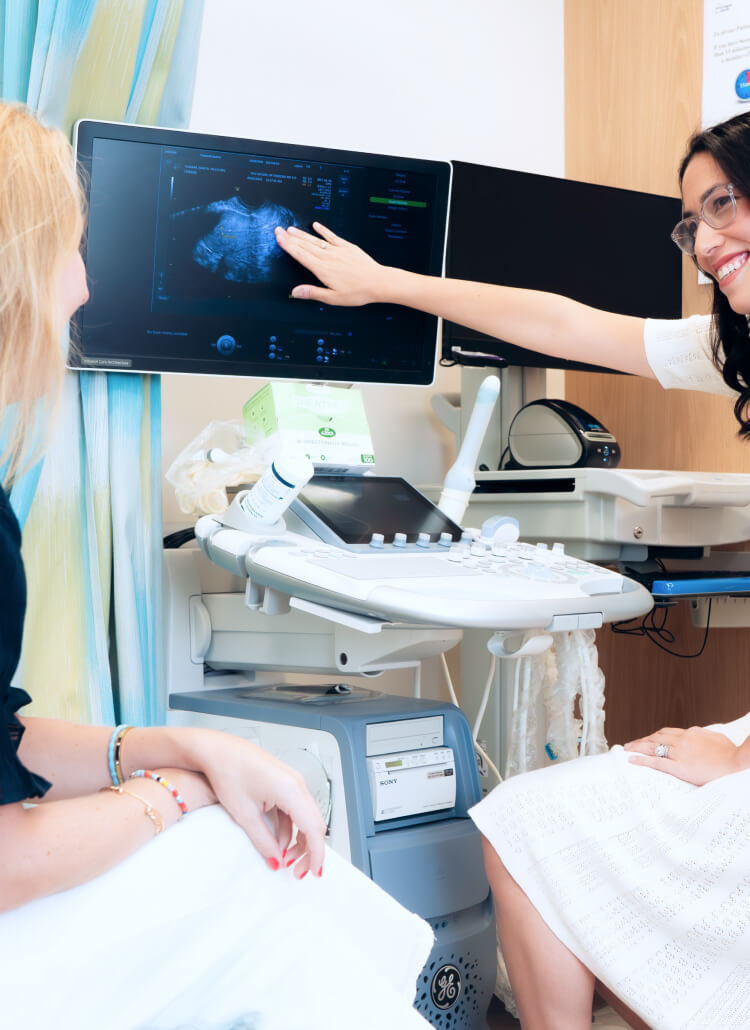What to Expect at Your New Patient Appointment at NYULFC
Our expert team uses cutting-edge fertility diagnostics and technology to assess your current reproductive health and determine if fertility treatment is right for you.
Embarking on a fertility journey is exciting, but there are several necessary steps to complete before jumping straight into a treatment like in vitro fertilization (IVF) or intrauterine insemination (IUI). During your new patient appointment at NYU Langone Fertility Center (NYULFC), you’ll share your health history, fertility concerns, and any problems you've encountered while trying to conceive.
Then, we'll conduct a comprehensive fertility screening to assess the health of your reproductive system. This testing involves bloodwork, an ultrasound, and a consultation with one of our expert fertility physicians. These results will help us determine the best fertility treatments for your needs and family-building goals.
When Is Fertility Testing Recommended?
During your first patient appointment, we'll likely discuss fertility testing to help create a treatment plan that maximizes your chances of conception. We recommend testing for individuals and couples who:
- Have been trying to conceive for one year (if under the age 35) or six months (if over the age 35) without success
- Have a family history of early menopause
- Are interested in fertility preservation (egg freezing)
- Are part of the LGBTQ+ community and seeking to build their families
Female Fertility Testing
Female fertility testing involves bloodwork and transvaginal ultrasounds to assess anti-mullerian hormone (AMH) and follicle stimulating hormone (FSH) levels as well as an antral follicle count (AFC). As a woman ages, her ovarian reserve decreases. These tests assess ovarian reserve, the quantity and quality of eggs remaining in the ovaries. Individuals diagnosed with diminished ovarian reserve (DOR) may consider various options to achieve pregnancy, such as fertility preservation, IVF, donor eggs, and more.
Anti-Mullerian Hormone (AMH) Testing
AMH is produced in ovarian follicles and measured through blood work. It can help assess a person's ovarian reserve, although it does not indicate egg quality or predict a woman's ability to get pregnant in a specific month. AMH levels are highest during puberty and decline gradually as women age.
Follicle Stimulating Hormone (FSH) Testing
FSH is produced by the pituitary gland and is essential for the development of maturing follicles. FSH levels are often used to assess the quality of eggs being produced. In both male and female hormones, excessive or insufficient FSH levels can affect fertility. FSH levels can be tested through a simple blood test on day two or three of the menstrual cycle, which begins on the first day of bleeding.
Ovarian Reserve Testing
Ovarian reserve testing evaluates egg count and can help identify potential concerns before egg freezing. Our physicians determine ovarian reserve through ultrasounds and blood tests, interpreting the results and what they may mean for an individual’s specific fertility journey.
Transvaginal Ultrasound
During a transvaginal ultrasound, our physicians can assess antral follicle count (AFC) to measure ovarian reserve and understand a patient’s fertility in relation to their age. Ovarian follicles house immature eggs inside the ovaries of the female reproductive system. Throughout a typical menstrual cycle, several follicles develop, and one mature egg is released during ovulation. Antral follicles, which are large enough to be seen via ultrasound, develop during the early stages of the menstrual cycle. During an AFC, we use the ultrasound image to visually count the number of egg-containing follicles developing in each ovary.
Male Fertility Testing
At NYULFC, we'll evaluate your health history, as well as conduct a thorough examination, hormonal testing, and multiple semen analyses. A semen analysis evaluates sperm count, morphology (the shape of the sperm), and motility (how well sperm swim), helping us pinpoint potential issues with sperm.
The Semen Analysis Process
For us to perform a semen analysis, patients can either produce a sperm sample at home using a sterile container from our facility or visit our office to give a sample. Then, our andology staff will test the sample in our state-of-the-art laboratory. The results will be discussed between the patient and the physician.
Preparing for Your First Patient Appointment
We suggest writing down your questions and concerns before you speak with our fertility specialists. You can also bring something to take notes on during your appointment. If you have medical records from previous fertility treatment, please send these to your physician’s medical secretary before your first visit, or bring them with you on the day of your appointment.
Questions to Ask During Your First Patient Appointment
If you're unsure about what to ask during your initial fertility appointment, here are some common questions to consider:
- What specific tests do you recommend?
- What types of treatment does your clinic offer and how successful do you think each of them could be for me?
- Who will I communicate with regarding treatment questions or medical evaluations?
- How much does treatment cost and do you offer any financing options?
- Are there certain lifestyle changes you recommend?
- What are our next steps?
Schedule Your New Patient Appointment at NYULFC Today
No matter where you are in your fertility journey, NYU Langone Fertility Center is committed to providing exceptional clinical care to help you build the family of your dreams. Our first job is to support you, so please bring all your questions to our team of world-class specialists for an introductory consultation. Our new patient appointments can set a strong foundation for your path to parenthood. Contact us today to schedule an appointment.



